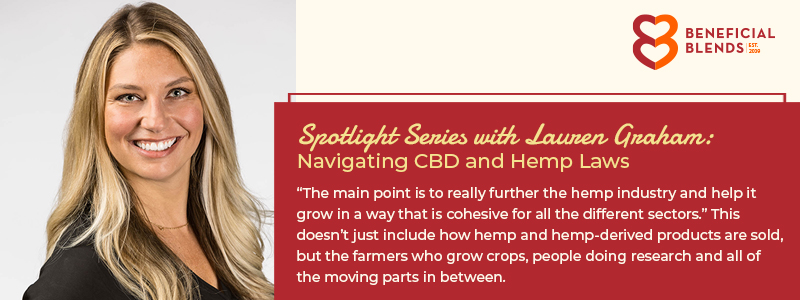
Spotlight Series with Lauren Graham: Navigating CBD and Hemp Laws
If you aren’t a lawyer, chances are you don’t know a whole lot about the legal side of CBD, cannabis, or hemp. Luckily, our in-house, legal counsel Lauren Graham is here to help navigate these confusing regulations. Lauren has been working within the cannabis and hemp industry since the 2018 Farm Bill and has recently been appointed to the Hemp Industries Association Board of Directors, to help advocate for the hemp industry. (More on that later). Let’s learn about CBD regulation!
Timeline of CBD Regulation
CBD, also known as cannabidiol, is a chemical compound found in hemp plants. These plants have been around for centuries, and their therapeutic uses have been used widely around the world. Here’s a brief timeline of CBD regulation in the US:
- 1800s-Cannabis/hemp plants used for medicinal purposes in the US
- 1900s-Cannabis/hemp plants used for industrial purposes in the US
- 1937-US Act bans cannabis use in the US
- 1940-Roger Adams first isolates CBD from the cannabis sativa plant
- 1946-Raphael Mechoulam isolates and describes CBD structure
- 1970-Cannabis/hemp labeled as controlled substance
- 2014-Farm Bill allows for regulated cannabis research
- 2018-Farm Bill
2018 Farm Bill
The 2018 Farm Bill is the most recent legislation we have regarding CBD and hemp plants. This bill changed some major policies within the cannabis industry. First, it legalized the production of hemp as an agricultural commodity under specific regulations. Under the USDA (United States Department of Agriculture) and DEA (Drug Enforcement Administration), farmers could begin growing hemp (with less than .3% THC). This bill also removed hemp and hemp derived products from the controlled substance list. While federal legally, the status of CBD is in somewhat of a limbo, as individual states have their own rules about regulation and consumption.
Is CBD Legal?
The short answer, YES. According to Lauren, “CBD itself is legal in all 50 states. But, once you start putting it into ingestible products, that is when there starts to be this patchwork of regulation, and all states are different”. Lauren hopes in the next year or two for a new Farm Bill that will come out with federal guidelines for everyone to follow.
Lauren believes the most difficult part of the industry is how slowly regulation and education happen. She wishes policy makers would be more open-minded and “take their foot off the brakes” a bit. She notes that there is now a clear distinction between what is considered hemp and what is considered marijuana that many people are not aware of. There are numerous uses for hemp and hemp-derived products that most don’t know exist. This slow acceptance and lack of education has decelerated the regulation process as a whole.
CBD Today
The CBD industry has exploded since the 2018 Farm Bill and is expected to continue growing as the cannabinoid becomes regulated. The hemp and CBD industry has patiently been waiting for the FDA (Federal Drug Administration) to clearly define labeling, testing and quality guidelines to ensure safety for all consumers. As it stands, businesses cannot market CBD as a dietary supplement or treatment for medical problems such as anxiety. This is because the FDA has approved a prescription drug called Epidiolex whose active ingredient–CBD, is used to treat seizures. Because CBD is the active ingredient in this prescription medication, businesses must be extremely cautious about how they market their CBD products to avoid being fined by the FDA.
Hemp Industries Association
There are multiple associations and groups across the country that are dedicated to pursuing regulation from the federal government and advocating for CBD. Associations like the Hemp Industries Association are paving the way for businesses, manufacturers, farmers, and consumers alike.
Lauren is a newly appointed board member for the Hemp Industries Association which is made up of businesses, farmers, and people with the shared goals of setting standards for hemp products and legalizing hemp in the U.S. Their mission statement reads-
“To advance the hemp economy and educate the market for the benefit of our members, the public, and the planet.
According to Lauren, “the main point is to really further the hemp industry and help it grow in a way that is cohesive for all the different sectors.” This doesn’t just include how hemp and hemp-derived products are sold, but the farmers who grow crops, people doing research and all the moving parts in between. She is looking forward to getting more people involved and spreading the word about hemp. To start the year off, the HIA is focusing on realigning with their mission statement and refocusing on education and advocacy to plan out the next actionable steps for the year.
Learn more about the Hemp Industries Association here.
If you have a question you’d like to ask Lauren, you can fill out the Contact Us form here.
